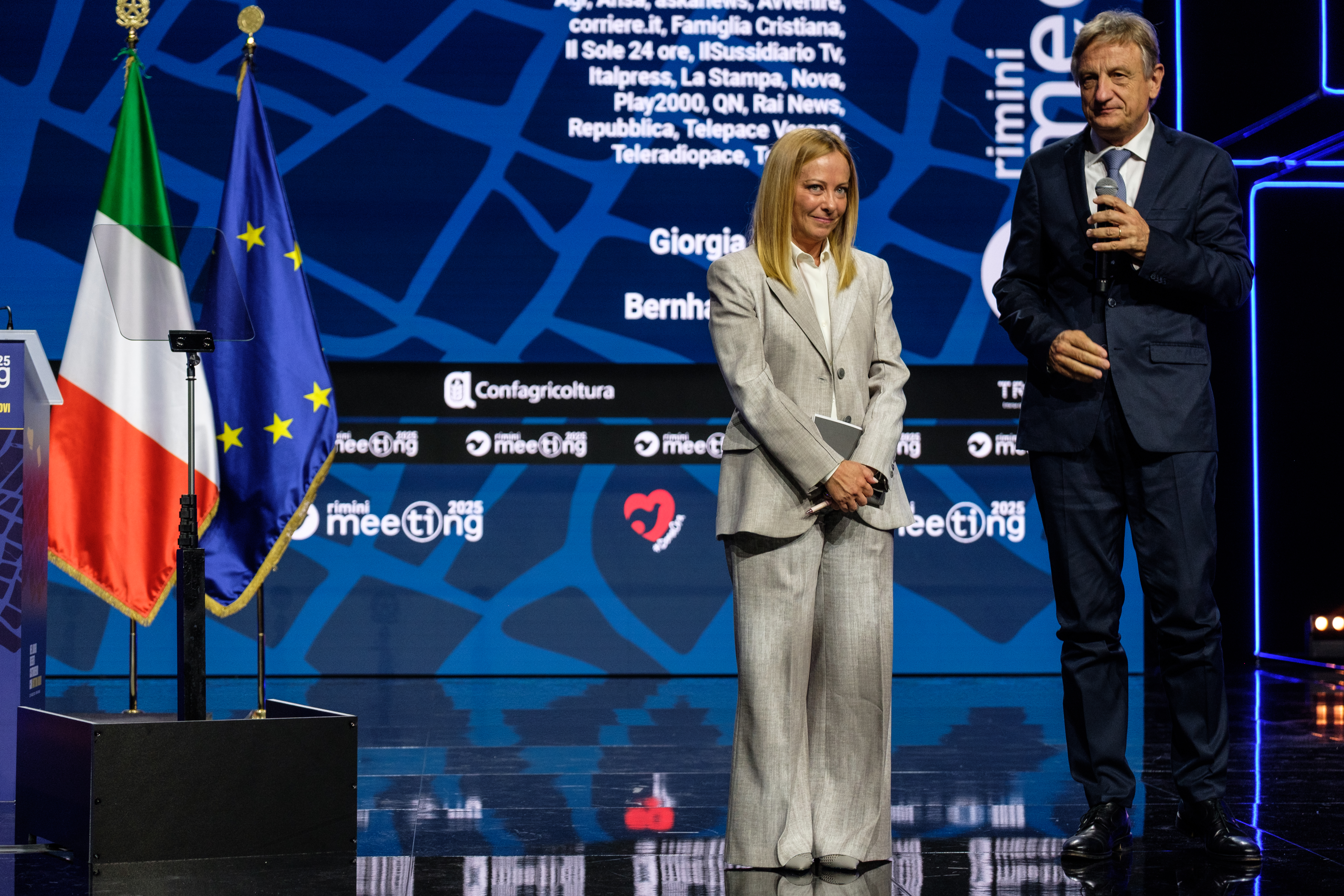Vatican City – At the Rimini Meeting, Giorgia Meloni delivered a speech without opposition: staged applause, slogans, and identity rhetoric. But after nearly three years in power, how many of the so-called “new bricks” she claims to have laid are solid achievements, and how many are mere propaganda?
The form: an acclaimed monologue
What stands out is not so much the content as the style. An address of more than an hour, without questions, without interlocutors, interrupted only by applause. Not a dialogue—which would have been consistent with the spirit of Communion and Liberation over the past forty-six years—but a self-congratulatory monologue. The format resembled more a party rally than an institutional speech by a head of government.
The audience, made up largely of sympathizers, rose to its feet at every heightened tone, at every slogan delivered by the prime minister reading from the teleprompter. It wasn’t the substance of her words that drew approval, but the fact that Meloni repeated exactly what the crowd wanted to hear. It is true: she lays claim to certain Catholic values, though more in words than in deeds. But granting her a platform for yet another rally seems excessive, even for communities that—sadly—are less concerned with political coherence or relations with the Church and the Holy See, and more with the exercise of power itself. For some, distorting the Meeting’s founding spirit, it is enough simply to exalt whoever holds the scepter. Bernard Scholz’s opening remarks were emblematic: an introduction where praise for the government replaced even the minimal appearance of neutrality that Rimini’s Meeting should at least pretend to maintain.

The rhetoric of the “new bricks”
The speech revolved around the metaphor chosen as this year’s theme by the Meeting—“new bricks”—which Meloni promptly bent into political slogans. But what does it actually mean? Which bricks have truly been laid in almost three years of government, and which exist only as rhetorical props?
Foreign policy: she boasts of Italy’s “restored authority.” But is that a structural result, or just the by-product of an international context (Ukraine, Gaza, US–EU relations) that forced her into predetermined choices?
Immigration: she proclaims a sharp drop in arrivals. Yet the numbers show fluctuations tied mainly to Libya and shifting routes, not to any structural policy change. Meanwhile, millions have been wasted on “hotspots” that today remain empty.
Caivano and law enforcement: she holds up a model of urban renewal. But can it really be replicated nationwide, or was it merely a showcase intervention, more useful for image than substance?
Birth rate and families: she promises housing plans for young couples and points to leave policies and childcare. Yet after three years, demographic data continue to worsen, leaving Italy at the bottom of Europe.
Employment: she celebrates “one million new jobs” and record female participation. But how many are stable? And how does the quality of work measure up against spreading precarity?
 © Meeting di Rimini
© Meeting di RiminiThe easy applause of the Meeting
Several passages seemed tailor-made to guarantee ovations from the Rimini audience: the invocation of Pier Giorgio Frassati, references to religious and Western identity, the attack on welfare subsidies, the defense of the traditional family. Not to mention the instrumental use of divisive themes, framed more “against” someone than as inclusive proposals. These are topics dear to Communion and Liberation and to Rimini’s public, yet only loosely tied to concrete government measures. The question therefore remains: how much of this was real policy, and how much simply propaganda aimed at consolidating her base?
The underlying ambiguity
Meloni presents herself as a pragmatic leader, beyond ideology, yet her speech was steeped in identity rhetoric: the West, Christian tradition, the threat of creeping nihilism. On the one hand she rejects ideology, on the other she builds a new one—crafted for consensus.
The Rimini Meeting, long praised as a true forum for dialogue, this time turned into a catwalk for a monolithic speech. Giorgia Meloni, after nearly three years in government, still speaks more like a party leader on the campaign trail than a prime minister accountable for her decisions. She arrived at 11:50, gave her scheduled address at noon, and left without answering a single question from journalists. A questionable modus operandi, one that over time erodes her image. There were, admittedly, some valid points—such as her remarks on judicial reform: “We will carry on with justice reform despite interference from a minority of politicized judges who try to replace Parliament and the will of the people. We will move forward, not to subject the judiciary to politics—as some poorly informed, or more often bad-faith critics claim—but to make justice more efficient for citizens and less conditioned by the weeds of political factions and ideological bias. To free it from politics.”
A sound principle, yet it cannot obscure another unresolved issue: many distortions in the system stem from the operational arm of the prosecution—law enforcement. Some officers—not all, and the younger generations do offer hope—still display poor training, abuse of power, and the belief they can act with impunity. The result: flawed investigations, overreach, corruption, personal interests undermining justice. Added to this is the treatment of the press, worsened by this government’s complicated relationship with free journalism.
And still, the government offers police unconditional, uncritical defense—hardly constructive. It even calls for erasing articles from the criminal code. Authoritarian and nostalgic tendencies linger in certain circles, especially among older ranks. One episode alone illustrates the point: while Meloni spoke at the Meeting, barely a kilometer away some forty officers kept watch over a group of just ten young people staging a peaceful protest. A picture worth more than many words. So the question lingers: behind these “new bricks”, are there solid foundations—or only papier-mâché walls built for easy applause?
T.B. & J.S.
Silere non possum